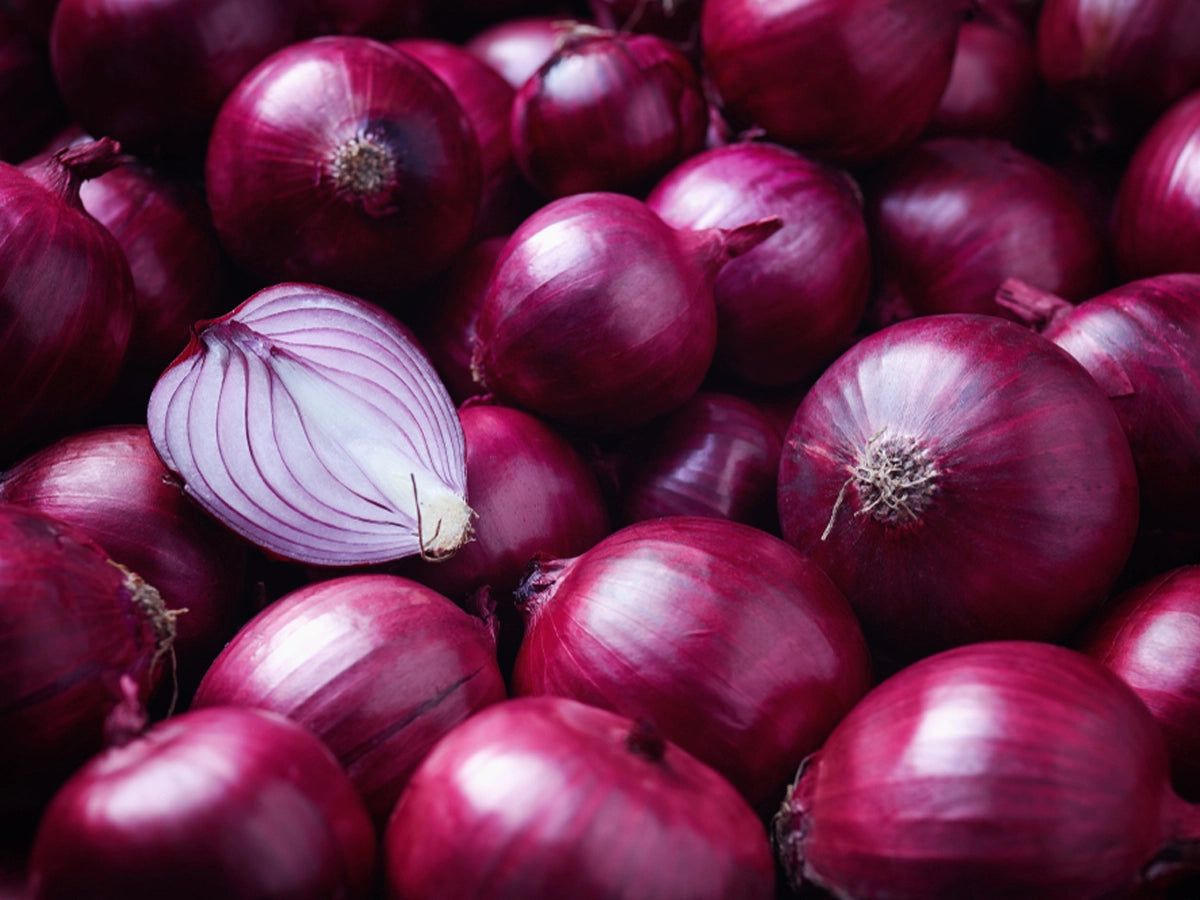How to Grow
Onions Are Good for You: Health Benefits, How to Grow, and Care Tips
It may smell pungent and make you cry, but nothing can uplift the taste of vegetables better than this round, circularly layered vegetable.
You guessed it right – it is none other than onions.
Research says that organic sulfur compounds and quercetin strengthen onions to fight diseases like diabetes, cancer, and nasal congestion.
The world now knows and approves of the strength of onions in improving hair health. That’s why you will see many such onion-infused hair oils and other hair products on the market.
Eaten raw in salads and cooked for almost all dishes – onions, like tomatoes, add a particular weight to vegetables. They come in red, white, purple, and yellow colors, but in India, we are used to primarily eating red onions.
We will discover a lot of information about onions here. Today, in this blog, we will discuss the following: -
- Interesting facts about onions
- Major health benefits of onion
- How to grow onions at home easily
- How to take care of onion plants
So, let’s start our journey of knowing onions better.
Interesting facts about onions
- Since they date back thousands of years to Central Asia and the Middle East, onions are one of the oldest vegetables.
- Historians believe that onions have been cultivated and used for more than 5000 years.
- It’s pretty interesting to learn that the giant cells of onions facilitate the study of “cell structure” in science classes to teach the use of a microscope.
- We know that onions are food items with medicinal uses too. But did you know that onions were used in mummification in ancient Egypt?
- The story of Egypt doesn’t end there yet! In ancient Egypt, onions were believed to symbolize eternal life for their round shape and circular layers.
- We all know that the Olympics originated in Greece, and thus it won’t be hard to believe that the Greek athletes were aware of some tricks to strengthen their powers. The Greek athletes and soldiers ate onions and rubbed onion juice on themselves to enhance their stamina or energy.
- It is a long-standing custom in Greece to hang an onion on the door at the beginning of the new year to bring prosperity and health.
Major health benefits of onion
Almost every other dish is made with onions. They add flavor and taste to our food. Even the blandest vegetables become tasty with the addition of onions. Onions serve as a rich source of nutrients, vitamins, minerals, and organic substances, making them useful in medicine. The nutritional value and the potential health benefits of onions are presented below:
|
Calories |
40 |
|
Carbohydrates |
9g |
|
Calcium |
2% of daily recommended value |
|
Fat |
0.1g |
|
Protein |
1.1g |
|
Vitamin C |
12% of daily recommended value |
|
Vitamin B6 |
5% of daily recommended value |
|
Sodium |
4mg |
|
Potassium |
146mg |
|
Magnesium |
2% of daily recommended value |
|
Iron |
1% of daily recommended value |
May fights against cancer
Onions, especially red ones, have quercetin, a potent anti-cancer substance. Studies have led researchers to believe that this high quercetin content helps lower the chances of lung cancer, breast cancer, and colon cancer.
Reduces inflammation
The presence of quercetin and other flavonoids makes onions worthy of treating any inflammation-related disease. They help treat allergies by preventing the cells from releasing histamine. The nasal congestion is also treated by the antihistamine properties of onions. If you are injured, onions can also heal that wound faster.
May controls blood sugar
S-methyl cysteine – a sulfur compound and Quercetin present in onions may be conducive to maintaining the blood sugar level. These substances promote insulin production, making onions a must in the diet. Also, the presence of chromium may help in regulating diabetes.
May prevent heart-related disorders
Many people have problems with the sharp, pungent smell and strong taste of onions. That taste and smell are due to the presence of organic sulfur compounds. These compounds are believed to reduce cholesterol and break down blood clots. Thus, the risks of heart attack or stroke are decreased considerably.
Good for respiratory health
Onion extracts can help people with respiratory conditions like asthma and allergic rhinitis. The prebiotics in onions can help clear nasal congestion, promoting restful sleep.
May prevent Alzheimer's disease
Onions are particularly rich in flavonoids, which are plant compounds. According to one study, those who eat a long-term diet rich in flavonoids have a lower risk of developing Alzheimer's disease.
Great for Oral Thrush
The sulfur compounds - thiosulfinates and thiosulfonates, which are abundant in onions, aid in the scaling down of the bacteria that cause tooth decay. Enhanced with vitamin C, onions maintain the health of the teeth. Also, tooth discomfort can be relieved by onions.
Instrumental in hair re-growth
Onions are abundant in antibacterial and antifungal properties, strengthening hair and boosting growth. Applying onion juice topically on the scalp may help prevent graying, thinning, and breakage and promote hair growth, even on bald patches. Onions help with good blood circulation in your scalp, promoting hair growth and treating dandruff.
How to grow onions at home easily:
Onions don't need a lot of room and may be grown indoors in attractive pots. You may produce new onions from old onion scraps or seeds since onions naturally re-sprout. So, learn the onion growing techniques below: -
From root bulb
- The first important step in this method of growing onions is selecting a suitable container that is deep and wide with good drainage holes. Remember, the deeper your container, the bigger onion it will produce. And if your container is more expansive, you can have space to grow many onions. Onions require 3 inches of space among them. So, you can go for a 6-inch or deeper container, and the width can be adjusted according to the space you want to keep.
- Fill the container with potting soil, leaving 1 inch of space. Optionally, at this stage, you may mix a nitrogen-rich fertilizer to increase the quality and size of the onions.
- Now, you need that part of the onion that you generally discard, i.e., the part from where roots grow. Save some of those discarded parts from your kitchen. You can also use an entire onion bulb.
- Plant the onion bulbs 2 inches deep into the soil and cover them with soil. Add water to moisten the soil.
- Look for a sunny spot on your balcony, kitchen window, or terrace, and place the container there. It should receive at least 6-7 hours of sunlight daily. If it is winter or cloudy outside, you can arrange for artificial plant lights.
- Check the soil daily, and apply some water if it is dry. Remember, the soil should remain moist and not soggy. Just press the topsoil and check if it requires water or not. Depending on the outside weather, water requirements would vary. In cold climates or winter months, 2 inches of water per week is enough, while that will increase in hot climates or summer months.
- When the sprouts reach 3 inches in height, you can harvest them. You can also allow the bulb some more time to grow and harvest. It will take roughly four to five months to harvest.
From seeds
- It would be nice if you chose a partitioned container with drainage holes. It can be 6 inches deep and moderately wide.
- Fill each cell of this container with potting soil, leaving about half an inch of space. You can apply a nitrogen-rich fertilizer to the soil only at this stage.
- Buy onion plant seeds, and plant them on top of the soil in each cell. Opt for 2-3 seeds on each cell and then cover them with a light layer of soil.
- Slightly moisten the soil so the seeds find a comfortable environment to germinate.
- Place the pot in a sunny spot so that it receives 6-8 hours of sunlight daily.
- Water the soil whenever you see that it has dried out. If the weather is too hot or during summer months, this plant will require 3 inches of water every week.
- When you see the seedlings have grown to 3 inches tall, you can either harvest them or transplant them to a bigger pot or outside garden. This transplanting will assure bigger onions.
How to take care of onion plants
Onions are one of the most easily grown vegetables. You can grow them in fancy pots indoors and use them for your kitchen requirements. Here are some care instructions that you must follow to keep the onion plants healthy: -
Sunlight
Onions thrive in bright sunlight. It is important to offer at least 6-8 hours of full sunlight to them. They are never tired of staying under the sun.
Location
A sunny spot in your home that enjoys sunlight for at least 8 hours is the best location to keep onion plants.
Soil
A loose, loamy soil would be best for the growth of onions. The soil for onions has to be rich in organic matter and well-drained so you may add sand to it. The ideal soil pH would be between 6.0 and 7.0.
Water
Onions require frequent watering to support bulb swelling. Give them 1 inch of water per week. However, avoid overwatering the bulbs or letting them linger in wet soil, as this might promote bulb rot. To keep the moisture in the soil, apply a thin layer of mulch.
Temperature
The ideal temperature for the vegetative phase of onions is between 13 and 24 degrees Celsius. For bulb development, the optimal temperature should be between 16 and 25 degrees Celsius.
Fertilizer
Onions are moderately heavy feeders. To encourage leaf growth, which will result in large bulbs, fertilize them every few weeks with a high-nitrogen fertilizer. The moment the soil cracks around the bulb, you will know that the foliage growing cycle is over, and you can stop fertilizing the plant now.
Onions are used as a taste enhancer in all our kitchens. When you grow this root vegetable in your garden, you know it is devoid of chemical fertilizers or harmful pesticides. Moreover, it is easy to grow. So, try your hands at gardening and grow tasty onions.
FAQs related to Onions
Is it good to have raw onions?
Yes, it is good to have raw onions. Onions contain organic sulfur compounds, and you acquire most of them by eating them raw. These compounds help reduce the risk of heart disease and aid your body in combating many other threats of ailments.
How long will it take my onion plants to grow onions?
The onion plants, given reasonable care, would be ready for harvest within 80–150 days from the planting date.
Eating how much onion is considered healthy?
You may eat a medium-sized onion, which, when chopped, is equal to roughly a cup.
Do onions like wet or dry soil?
Onions thrive in slightly moist soil. So, when watering, make sure not to make the soil soggy.
Can one onion be used to grow another onion?
You may grow your onions from cuttings by slicing off the bottom of an onion bulb and placing it in soil.
When is onion harvested in India?
In India, onions are harvested twice a year: once from November to January and again from January to May.



